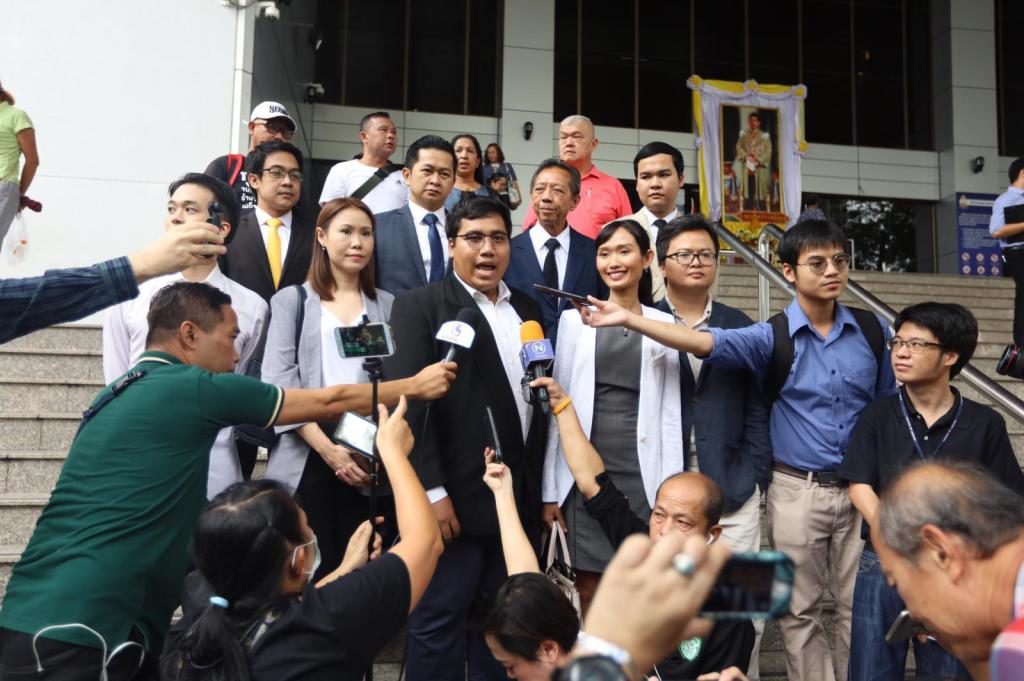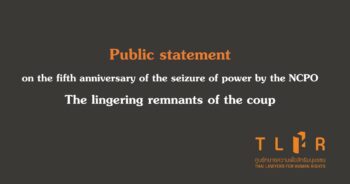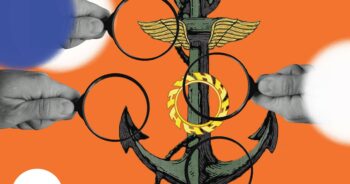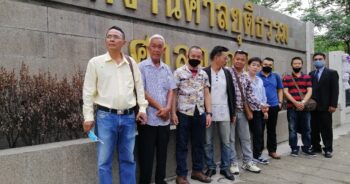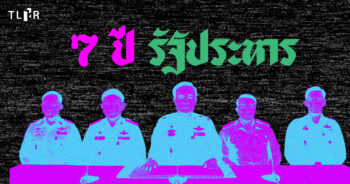The document submitted by Gen Burin Thongpraphai, former legal officer of the NCPO, as evidence to support the prosecution for the case against six core members of the “We Want Elections Group” (RDN50) exposes how the NCPO has used the successive crime reporting as a tool to suppress political activists and dissidents. The legal actions are meant to put pressure, shackle, and restrict the freedom of expression of the targets, causing them to be less active. Meanwhile, the document also reveals how Information Operation (IO) has been proposed to use along with the judicial harassment in order to discredit the demonstrations of the We Want Elections Group and misinform the public that their particular movements were the cause of social disunity.
An attempt to render the public as enemies?
On the morning of 27 November 2019, the House of MPs’ Committee on Legal Affairs, Justice, and Human Rights met to review complaints about judicial harassment launched by the authorities aiming to intimidate political dissents since the 22 May 2014 coup. Presenting at the meeting to testify before the House of MPs’ Committee were Gen Burin Thongpraphai, Director of the Royal Thai Army’s Office of Judge Advocate, and Col Pithakphon Chusri, aka “Seth Peat” – Commander of the 22nd Ranger Forces Regiment.
One of the intriguing issues and questions have emerged from the meeting: whether in the past few years, the NCPO files “SLAPP” cases against political dissents or not? According to BBC Thai, Gen Burin insists that personally he never engages in an attempt to intimidate the activists and politically-active citizens. But when offenses are committed, he is authorized to report the case against the offenders. “Given the legitimacy of the orders, I am left with no other choice but to enforce the law. Otherwise, I could be found guilty of not taking the action.” As to the opposition groups to the dictatorial government, he said he personally hold no grudges against them. Rather, they are, in his view, citizens – fellow brothers and sisters who are also considered as Thai just like himself.
“We have never attempted to treat the public as our enemies. No countries, states or military authorities try to render the people as their enemies. The military must always be siding with the people.” Concerning the reporting and the prosecution of the cases, he refers to the inquiry officer whom the Committee needs to reach to follow up; as for him, he has received no instruction from anyone to do so.
Regarding to the testimony, the Thai Lawyers for Human Rights (TLHR) would like to invite you all to read the document presented to the court as one of the Exhibits in RDN50 case (one of the demonstration’s series of We Want Election group), claimed to be submitted to the inquiry official by Gen Burin, who is authorized by the NCPO to report the demonstrators; in the aforementioned document, there is an instruction on the strategic lawsuit against the dissidents which drastically contrasts to his statement presenting before the MPs’ Committee.
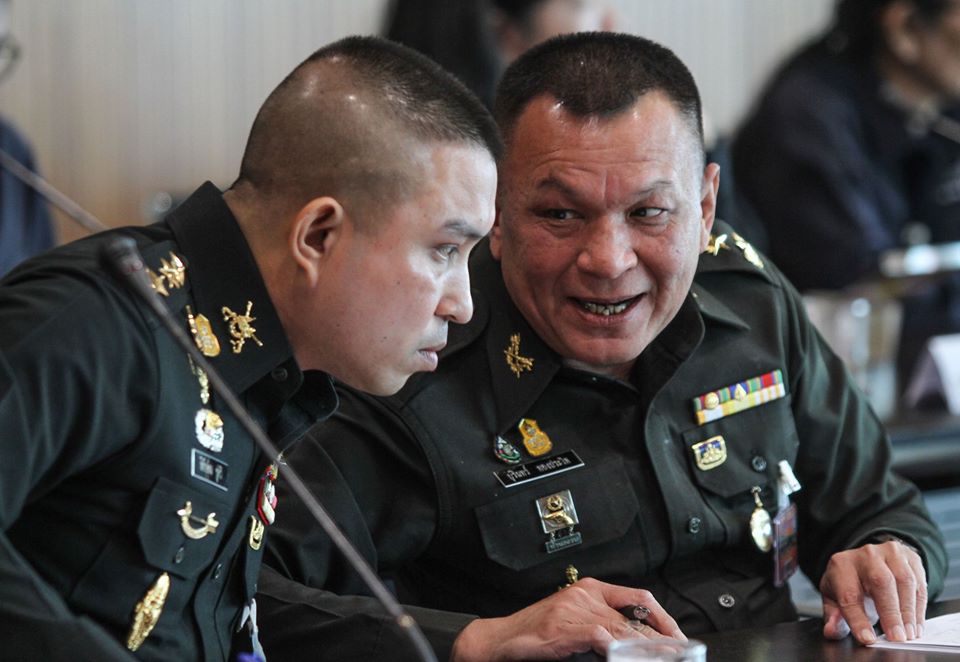
Core members of We Want Elections Group were put under the process of prosecution for one and a half years before the case was dismissed by the Court.
The document appeared in the investigation report in the case against core members of We Want Elections Group, who conducted the public assembly at the Democracy Monument on Ratchadamnoen Road on 10 February 2018. The case is otherwise known as “RDN50 case”. Col Burin Thongpraphai (his rank at the time) was authorized by Maj. Gen. Wijan Jodtaeng, Chief Legal Officer of the NCPO, to report the case to the police. The charges were pressed against the core members who organized the assembly and participants of the assembly.
The case against the core members involved seven individuals who were accused of violating the Penal Code’s Article 116 (Sedition) and the Head of the National Council for Peace and Order no. 3/2558’s Article 12. However, it has since been split into two cases including (1) the case against six core members including Mr. Sirawith Seritiwat, Mr. Kan Pongpraphan, Mr. Anon Nampha, Ms. Nuttaa Mahattana, Mr. Sukrit Piansutham, and Ms. Chonticha Jaengrew and (2) the case against Mr. Rangsiman Rome who is now a Member of Parliament. Given his MP’s duty to attend the parliament’s convention session, the case against Rangsiman Rome has been put under separate investigation.
The RDN50 case against the six core members has its witness examination completed since August 2019, including ten prosecution witnesses and seven defense witnesses.
The Criminal Court has already ruled to dismiss this case on 20 September 2019 as the assembly is deemed peaceful and unarmed, without violence and public turmoil. The Court made a review that no force was used to coerce the government to act according to the demonstrators’ demands. The demonstrators simply demanded prompt elections in 2018 and that they refrained from using intrusive language. The demands made by the defendants were found to be in compliance with the Constitution. The speeches and comments were also made in good faith. The defendants’ acts, therefore, could not be construed as an attempt to cause turbulence and to bring about an insurrection in the country. Even though certain words could be deemed too strong or too atrocious, but they are parts of criticism against the government which can be made under democratic principles.
Even though the Court has eventually ruled to dismiss the case, it was, however, lingering in the justice process for over a year. The defendants still have to wait further for the case to be completely dismissed until the prosecutor decides not to appeal the ruling,
Please see the verdict Six core members of RDN50 acquitted; the Court ruled their action as constitutional and not seditious And see the timeline of the case The road to the justice of RDN case: The fight of the We Want Elections Group on Ratchadamnoen Road
Revealing the plaintiff reports: successive police report, coupling with the use of IO, to accuse We Want Elections Group
An intriguing issue has emerged from the RDN50 case as we look at the document submitted by the plaintiff and the accuser to use as an incriminating evidence during the court’s examination; such document demonstrates how the NCPO had used judicial harassment as a tool to suppress the exercise of freedom of expression and how the Information Operation (IO) had been utilized to launch a smear campaign against the political activists.
The document was included in the investigation report prepared by the public prosecutor and the inquiry official and was submitted to the Criminal Court as Exhibit J14. The two-pages document is titled “A reflection on the demonstrations by the anti-NCPO activists at the Democracy Monument on 10 February 2018”, which has no reference in the document referring to the author, affiliated agency, or any public official.
| A reflection on the demonstrations by the anti-NCPO activists at the Democracy Monument on 10 February 2018 (Translated version ) 1. Concerning the 10 February 2018 demonstration staged by the MBK39 to voice their opposition to the NCPO at the Democracy Monument, Ratchadamnoen Nok Road, Phra Nakhon, Bangkok with the number of participants peaking at 400. From our investigation, it was found the core members who organized the public assembly had come from two groups including; 1.1 Eleven MBK39 existing core members (excluding nine other core members who have already been charged) including; 1.2 The newly-emerging members, 29 of them including; 2. From our observation, Mr. Rangsiman Rome, Mr. Sirawith Seritiwat and Mr. Anon Nampha have opted for using strong language to criticize the government in order to blatantly instigate members of the public to come out and overthrow the government/the NCPO (as per the highlighted texts in the transcription of their speeches). Meanwhile, other individuals did not appear to use such strong language, although they clearly wanted to encourage people to demonstrate against the government and the NCPO as well. 3. According to the speeches by the six core members, it is obvious that they wanted to instigate and encourage members of the public to gather and oust the government and the NCPO. The acts of the core members are thus a violation of the Penal Code’s Article 116 and the Head of the National Council for Peace and Order no. 3/2558. Pros and cons with regard to reporting the case against them can be laid out as follows; 3.1 Pros As far as our operations against the anti-NCPO activists throughout the past three years are concerned, it has been found that despite having been reported to the police, the anti-NCPO groups still managed to continue their actions. The government thus far has failed to successively report the case against them. Therefore, if the government reported the case successively against, such repeat legal actions would put pressure on them and lead to the restriction of freedoms of the anti-NCPO activists. It would also lead to the toning down of language used by them during their further demonstrations. For comparison, between the 10 February 2018 demonstration and the 27 February 2018 demonstration, it was clear that the language used during the latter demonstration has become much softer. By reporting cases against them, it has obviously and prominently caused them to keep a longer interval between each of their assemblies. For example, (as a result of the recent case reported against them), the anti-NCPO activists have yet to announce when they are going to stage the next demonstration. It must be noted that the strings of case reporting against the core members are meant to put more pressure on and to trouble them, rather than to have them incarcerated in prison. Their incarceration can become a weak spot for the government; It can make the government vulnerable to criticisms from domestic and international human rights groups as well as academics and media. Such incarceration could galvanize more people to come out strongly against the government and that would backfire on the government. 3.2 Cons If the authorities rush to report the case against the core members and the demonstrators too soon, it would have galvanized more people to come out against the NCPO. It could be used as a pretext to unleash wider opposition and mobilization against the government. Also, it could be used as part of the Information Operation (IO) to galvanize the mass more promptly and conveniently. As of now, the former Red-Shirts themselves have yet to make any apparent move and the public at large rather show a neutral stance while monitoring the response of the government and the NCPO toward the demonstrations. Therefore, the reporting of a case against them should wait until other news to reign in and distract the public attention. Then, it would be the right time to report the case against them. Whether the government decides to press ahead in reporting the case against the core members or delays the reporting, the government still has to brace itself and get prepared for a backlash from international organizations, academics and other alliances who would come out to oppose and pressure the human rights violation. To minimize and lessen attention from the media, it is best not to remand them in custody during the pretrial.” 4. In conclusion, it is recommended to report against the core members since their political demonstrations have involved the Red Shirts and have received clear backing from the Pheu Thai Party’s politicians. Please note that the legal action against the core members should be made along with the Information Operation (IO) to convince the public that such demonstrations have not been conducted in good faith or by innocent groups including some academics and students. Rather, the demonstrations have been led by the Red Shirt key members who want to bring about social division and cause public turmoil. It is, therefore, an obligatory for the government to act to maintain public order and to rehabilitate the conducive atmosphere according to the planned roadmap for the upcoming election. The document “A reflection on the demonstrations by the anti-NCPO activists at the Democracy Monument on 10 February 2018” (Downloadable in PDF format at document presented during the prosecution in the RDN50 case Names of individuals including the demonstrators mentioned in the document are redacted) |
The document can be divided into two parts. The first part concerns a review of the demonstration on Ratchadamneon Rd. on 10 February 2018 and it indicates that around 400 people participated during the assembly on that day. Names of 40 individuals and their affiliations are also mentioned. The document further states names of three core members including Rangsiman Rome, Anon Nampha and Sirawith Seritiwat who were “using strong language to criticize the government in order to blatantly instigate members of the public to come out and overthrow the government/the NCPO”
In the latter part, the document analyzes the pros and cons of reporting the case against the six core members and alleges the demonstrators of committing an act that violates against the Penal Code’s Article 116 and the Head of the National Council for Peace and Order no. 3/2558. The main content of this section reflects well how the NCPO had been wielding its power in various aspects.
As for the pros, the document states that “As far as our operations against the anti-NCPO activists throughout the past three years are concerned, it has been found that despite having been reported to the police, the Anti-NCPO groups still managed to continue their actions. The government thus far has failed to successively report the case against them. Therefore, if the government reported the case successively, such repeat legal actions would put pressure on them and lead to the restriction of freedoms of the anti-NCPO activists. It would also lead to the toning down of language used by them during their further demonstrations.”
“For comparison, between the 10 February 2018 demonstration and the 27 February 2018 demonstration, it was clear that the language used during the latter demonstration has become much softer. By reporting cases against them, it has obviously and prominently caused them to keep a longer interval between each of their assemblies. For example, (as a result of the recent case reported against them), the anti-NCPO activists have yet to announce when they are going to stage the next demonstration. It must be noted that the strings of case reporting against the core members are meant to put more pressure on and to trouble them, rather than to have them incarcerated in prison. Their incarceration can become a weak spot for the government; It can make the government vulnerable to criticisms from domestic and international human rights groups as well as academics and media. Such incarceration could galvanize more people to come out strongly against the government and that would backfire on the government.
As for the cons of reporting the case against the core members, the document alludes to that “If the authorities rush to report the case against the core members and the demonstrators too soon, it would have galvanized more people to come out against the NCPO. It could be used as a pretext to unleash wider opposition and mobilization against the government. Also, it could be used as part of the Information Operation (IO) to galvanize the mass more promptly and conveniently. As of now, the former Red-Shirts themselves have yet to make any apparent move and the public at large who show a neutral stance while monitoring the response of the government and the NCPO toward the demonstrations. Therefore, the reporting of a case against them should wait until other news to reign in and distract the public attention. Then, it would be the right time to report the case against them.”
“Whether the government decides to press ahead in reporting the case against the core members, or delays the reporting, the government still has to brace itself and get prepared for a backlash from international organizations, academics and other alliances who would come out to oppose and pressure the human rights violation. To minimize and lessen attention from the media, it is best not to remand them in custody during the pretrial.”
After reviewing the pros and cons, the document further recommends that “the case (should) be reported against the core members since their political demonstrations have involved the Red Shirts and have received clear backing from the Pheu Thai Party’s politicians. Please note that the legal action against the core members should be made along with the Information Operation (IO) to convince the public that such demonstrations have not been conducted in good faith or by innocent groups including some academics and students. Rather, the demonstrations have been led by the Red Shirt key members who want to bring about social division and cause public turmoil. It is, therefore, an obligatory for the government to act to maintain public order and to rehabilitate the conducive atmosphere according to the planned roadmap for the upcoming election.”
The inquiry official confirms that the document had been submitted to him by Col Burin Thongpraphai
During the witness examination, Pol Cpt Suwit Manhathao, inquiry official of Nang Lerng Police Station and one of the members of the investigation team, clearly testified about the background of this document. According to the testimony, on 13 and 14 February 2019, while Pol Cpt Suwit was responsible for the duties as inquiry official on shift during that day, Col Burin Thongpraphai who was authorized by the NCPO, had approached him and reported the case against Mr. Rangsiman Rome and five other defendants in relation to the demonstration of the We Want Elections Group on 10 February 2018.
Pol Cpt Suwit interviewed Col Burin himself and received evidence from the military officer: including photos of the demonstration, transcriptions of the speeches made by the core members at the demonstration and images captured from the facebook page that publicized information about the demonstration.
In his reply to questions from the prosecutor, Pol Cpt Suwit stated that Col Burin had handed over to him the document, the Exhibit J14 and other evidence aforementioned.
During his reply to cross-examination questions from the defense attorneys, Pol Cpt Suwit further stated that upon receiving the document from Col Burin, he had asked Col Burin to sign his name to certify the authenticity of all pages of the document. He had no idea as to why the Exhibit J14 contained no such signature by the military official, although he insisted that such document does not reflect the opinions of the inquiry officials in this case and that it reflected the opinion of the military as it had been handed over to him by Col Burin.
Pol Cpt Suwit gave further information that the inquiry official had failed to question Col Burin about the opinion stated on Exhibit J14 and the investigation team did not summon Col Burin to retrieve the document either.
Meanwhile, Col Burin Thongpraphai did not testify anything regarding the document during the witness examination. He insisted that during the reporting of the case, he had only brought to the inquiry official a CD containing photos of the demonstration, the transcriptions, name lists of core members and demonstrators, photos of individuals and images captured from the facebook page.
Traditionally, the prosecution’s evidence included in the investigation report have to be compiled by the inquiry official and shall then be presented to the public prosecutor who will have to rely on them to make a decision concerning the indictment and witness examination. The testimony from the inquiry official in this case thus clearly explains why the document has been added to the investigation report.
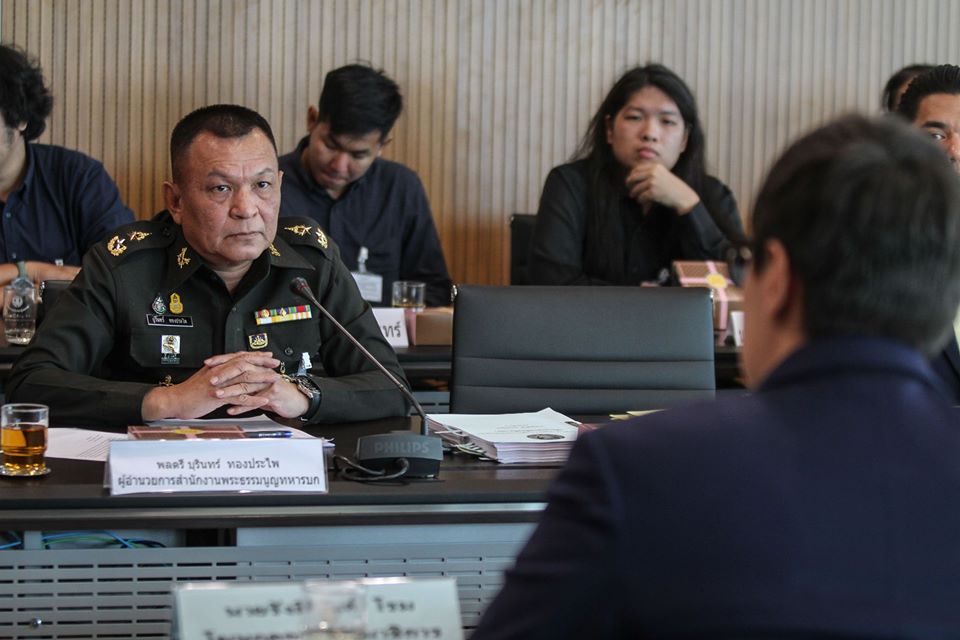
The document reflecting how laws and Information Operation have been used as a political tool to suppress the public from participating in the political movement during the NCPO era
Regarding the content from the document, the Thai Lawyers for Human Rights (TLHR) has the following observations we would like to express;
- In its analysis of the pros and cons of reporting the case to the police, the document clearly divides between “us” including the NCPO and the government vs “them” the people who voice their “opposition” or are politically active. Under such analysis framework, the public, particularly We Want Elections Group in this case, is treated as a “hostile party” to the government and the military. From the military’s point of view, the NCPO renders political dissents as their “enemies” whereby any methods can justifiably be adopted to suppress and preempt their opposition.
- The document also indicates that the reporting of cases to the police can be used as a political tool to shut down political demonstrations or mobilizations, or to make it more challenging to do so. That is due to the prosecution process which put them under sheer pressure and subjected them to more restrictions including the restriction of their freedoms.
The document clearly indicates how legal actions have been used simply to silence activists and dissents, to create burden and obstruct political mobilization (SLAPP: Strategic Lawsuit Against Public Participation). The person who reports the case knows full well of its consequences and does not care about the Court’s verdict, or the incarceration of the alleged. Rather, they harness police reporting for their political leverage and use the legal process as a tool.
This point of view demonstrates how “laws” have simply been used as a tool at hand by the political magnates who arbitrarily exercise their power to serve their political interest, rather than to use it to uphold rights and freedoms of the people or to ensure safety and security of the citizens. It clearly erodes the fundamental principle of the Rule of Law.
Obviously, during the NCPO era, “laws” including the Announcements and Orders decreed made by the NCPO as the usurpers and certain existing legal provisions and new legislation enacted by the NCPO-appointed National Legislative Assembly (NLA) have been used to take a number of people who have exercised their political expressions to court. Moreover, the Military Court has been used to try civilians. (Please see Statistics of legal cases concerning freedom of expression in the past five years by the NCPO). Such predicament has continued unabated until now. The document, therefore, sheds light on part of the paradigm of thought which has given rise to such situation.
- The document indicates that the authorities know full well that the legal actions taken against the core members of the political demonstrators including the remand in custody amounts to a human rights violation. Therefore, they have to calculate the pressure from human rights organizations, media or academics as a result of undertaking legal actions or incarcerating the core members. And they have alluded to various “tactics” to reduce such pressure, for example, by reporting the case against the targets, without having them remanded in custody, or by procrastinating the reporting of the case until after the demonstration, waiting until public attention is swayed by other news.
- The document clearly recommends that Information Operation (IO) should be used on the public. It mentions that aside from taking legal action, disinformation must be created as a part of a smear campaign to discredit the demonstrators of We Want Elections Group, purporting them as not an innocent force, but rather as being led by the Red-Shirts. Being projected as the movement that causes social division, it would be justified for the authorities to report the case against them in order to restore public order.
Based on such principle, Information Operation as a military tactic can be used against enemies as “an operation to impact or influence a decision-making process, news, and information system of the hostile party or other target groups. Such operation can also be used to protect our news and information system.” The aim is to put “us” on a higher plane to “them”. A critical question can be raised here: it is proper or not that the NCPO and the military have conducted such military operation, meant to be used during the war, against their own citizens?
During the past five years that the NCPO and the military had seized political power, they often claimed to try to forge reconciliation, unity and to end political polarization which has been going on for more than a decade in Thailand’s politics. But the “legal” actions and Information Operation carried out by the NCPO and the military in such manner would inadvertently divide the society between “us” vs “them.
This document confirms how NCPO has been part and parcel of the effort to instigate political polarization. As a part of the “law” enforcement, the NCPO has ironically involved with activities that violate people’s rights and freedoms to serve its political interest while claiming to forge reconciliation and to maintain public order, which could merely amount to yet another “political discourse”.
